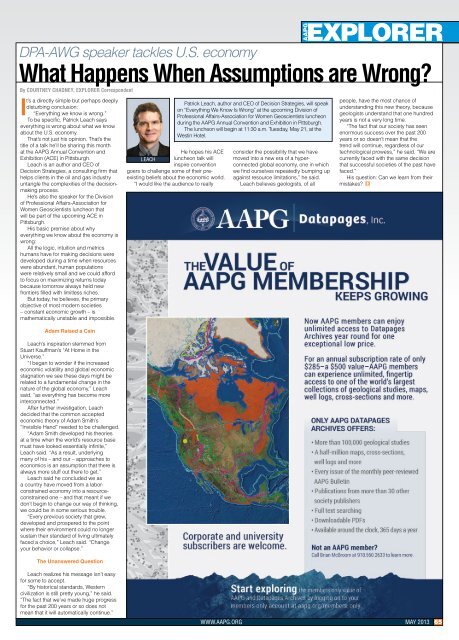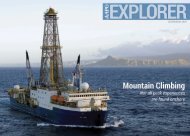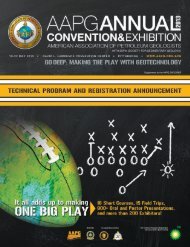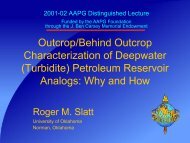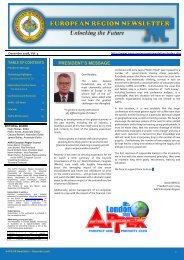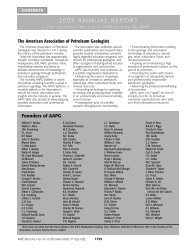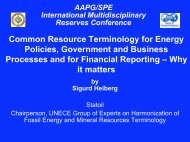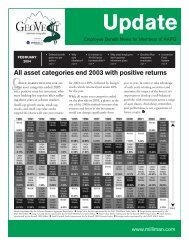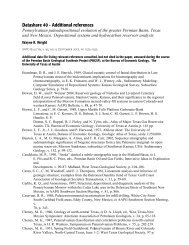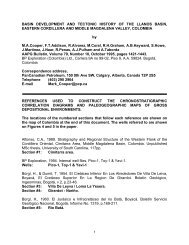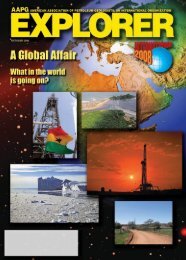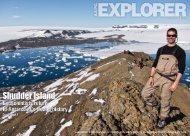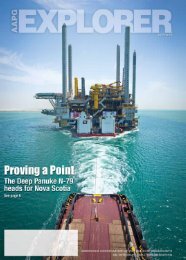Download - American Association of Petroleum Geologists
Download - American Association of Petroleum Geologists
Download - American Association of Petroleum Geologists
Create successful ePaper yourself
Turn your PDF publications into a flip-book with our unique Google optimized e-Paper software.
EXPLORER<br />
DPA-AWG speaker tackles U.S. economy<br />
What Happens When Assumptions are Wrong?<br />
By COURTNEY CHADNEY, EXPLORER Correspondent<br />
AAPG<br />
It’s a directly simple but perhaps deeply<br />
disturbing conclusion:<br />
“Everything we know is wrong.”<br />
To be specific, Patrick Leach says<br />
everything is wrong about what we know<br />
about the U.S. economy.<br />
That’s not just his opinion. That’s the<br />
title <strong>of</strong> a talk he’ll be sharing this month<br />
at the AAPG Annual Convention and<br />
Exhibition (ACE) in Pittsburgh.<br />
Leach is an author and CEO <strong>of</strong><br />
Decision Strategies, a consulting firm that<br />
helps clients in the oil and gas industry<br />
untangle the complexities <strong>of</strong> the decisionmaking<br />
process.<br />
He’s also the speaker for the Division<br />
<strong>of</strong> Pr<strong>of</strong>essional Affairs-<strong>Association</strong> for<br />
Women Geoscientists luncheon that<br />
will be part <strong>of</strong> the upcoming ACE in<br />
Pittsburgh.<br />
His basic premise about why<br />
everything we know about the economy is<br />
wrong:<br />
All the logic, intuition and metrics<br />
humans have for making decisions were<br />
developed during a time when resources<br />
were abundant, human populations<br />
were relatively small and we could afford<br />
to focus on maximizing returns today<br />
because tomorrow always held new<br />
frontiers filled with limitless riches.<br />
But today, he believes, the primary<br />
objective <strong>of</strong> most modern societies<br />
– constant economic growth – is<br />
mathematically unstable and impossible.<br />
Adam Raised a Cain<br />
Leach’s inspiration stemmed from<br />
Stuart Kauffman’s “At Home in the<br />
Universe.”<br />
“I began to wonder if the increased<br />
economic volatility and global economic<br />
stagnation we see these days might be<br />
related to a fundamental change in the<br />
nature <strong>of</strong> the global economy,” Leach<br />
said, “as everything has become more<br />
interconnected.”<br />
After further investigation, Leach<br />
decided that the common accepted<br />
economic theory <strong>of</strong> Adam Smith’s<br />
“Invisible Hand” needed to be challenged.<br />
“Adam Smith developed his theories<br />
at a time when the world’s resource base<br />
must have looked essentially infinite,”<br />
Leach said. “As a result, underlying<br />
many <strong>of</strong> his – and our – approaches to<br />
economics is an assumption that there is<br />
always more stuff out there to get.”<br />
Leach said he concluded we as<br />
a country have moved from a laborconstrained<br />
economy into a resourceconstrained<br />
one – and that meant if we<br />
don’t begin to change our way <strong>of</strong> thinking,<br />
we could be in some serious trouble.<br />
“Every previous society that grew,<br />
developed and prospered to the point<br />
where their environment could no longer<br />
sustain their standard <strong>of</strong> living ultimately<br />
faced a choice,” Leach said. “Change<br />
your behavior or collapse.”<br />
The Unanswered Question<br />
He hopes his ACE<br />
LEACH luncheon talk will<br />
inspire convention<br />
goers to challenge some <strong>of</strong> their preexisting<br />
beliefs about the economic world.<br />
“I would like the audience to really<br />
Patrick Leach, author and CEO <strong>of</strong> Decision Strategies, will speak<br />
on “Everything We Know Is Wrong” at the upcoming Division <strong>of</strong><br />
Pr<strong>of</strong>essional Affairs-<strong>Association</strong> for Women Geoscientists luncheon<br />
during the AAPG Annual Convention and Exhibition in Pittsburgh.<br />
The luncheon will begin at 11:30 a.m. Tuesday, May 21, at the<br />
Westin Hotel.<br />
consider the possibility that we have<br />
moved into a new era <strong>of</strong> a hyperconnected<br />
global economy, one in which<br />
we find ourselves repeatedly bumping up<br />
against resource limitations,” he said.<br />
Leach believes geologists, <strong>of</strong> all<br />
people, have the most chance <strong>of</strong><br />
understanding this new theory, because<br />
geologists understand that one hundred<br />
years is not a very long time.<br />
“The fact that our society has seen<br />
enormous success over the past 200<br />
years or so doesn’t mean that the<br />
trend will continue, regardless <strong>of</strong> our<br />
technological prowess,” he said. “We are<br />
currently faced with the same decision<br />
that successful societies <strong>of</strong> the past have<br />
faced.”<br />
His question: Can we learn from their<br />
mistakes?<br />
EXPLORER<br />
Leach realizes his message isn’t easy<br />
for some to accept.<br />
“By historical standards, Western<br />
civilization is still pretty young,” he said.<br />
“The fact that we’ve made huge progress<br />
for the past 200 years or so does not<br />
mean that it will automatically continue.”<br />
WWW.AAPG.ORG MAY 2013<br />
65


